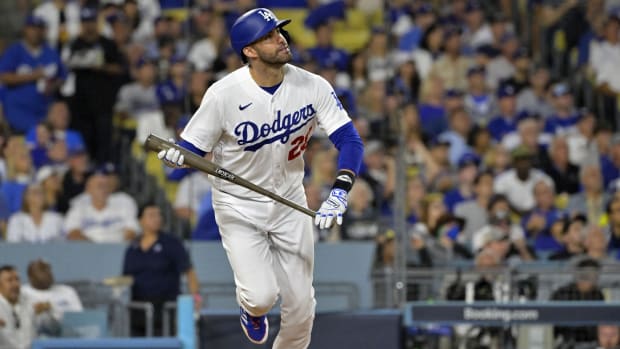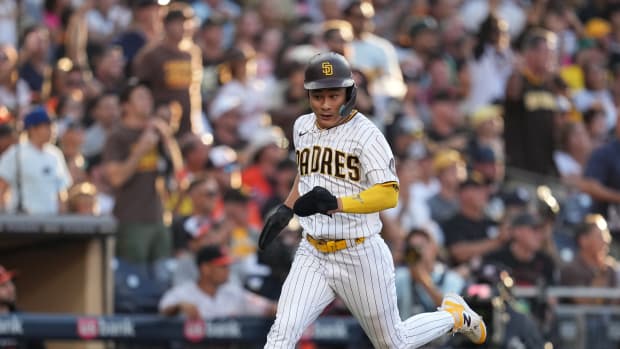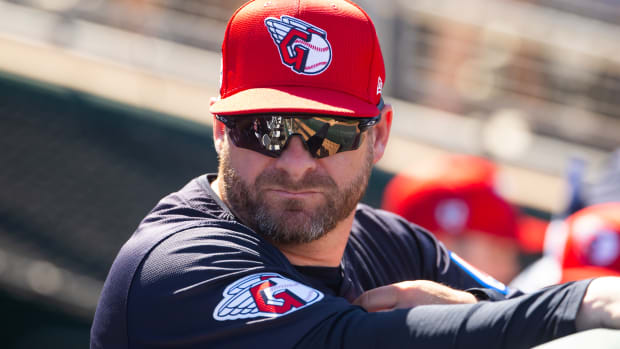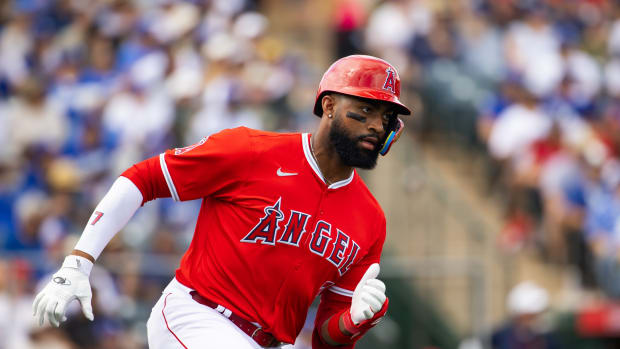With a Flip of His Bat, Bryce Harper Begins Next Chapter of His Career
WASHINGTON, D.C. – By the time Bryce Harper reached the visiting clubhouse at Nationals Park after three postgame interviews on the field, after obliterating a baseball farther than all but two of the 608 balls he hit at Nationals Park over the previous four years, after he practically cleared the stadium of once-tough Nationals fans who came to boo him with an epic bat flip to shame the most nifty of drum majors, after the Phillies were 4-0 for the first time in 104 years, and after what will stand as the unforgettable first game of the rest of his baseball life, his Philadelphia teammates were there waiting for him.
A large rack of multi-color, spinning disco lights stood at the ready for what is now the typical and frequent manner the Phillies light their postgame victory celebrations. But first Harper would speak.
“You guys have embraced me from day one,” Harper told them after his new team soundly beat his old one, 8-2, behind his three-hit, three-RBI, one-flip night Tuesday. Quickly, his voice began to crack and his eyes filled with emotion. “Thanks for having my back. Having your support means everything to me. I love you guys.”
Said Phillies pitcher Jake Arrieta, “He was very emotional. This night meant a lot to him. You could tell.
“I couldn’t be happier for him and this team. It’s just the start of something special. He feels it. We feel it. This is a night he will remember for the rest of his life. I will never forget it, either. The way he ran around the bases, smiling from ear to ear, to see him so happy like that was just so cool.”
Harper has hit three home runs in his first four games as a Phillie. Maybe this is just the chimera of a small pocket of time and space. Harper, after all, owns the highest career OPS in April of any hitter in baseball history except two: Babe Ruth and Barry Bonds. His F1 engine of a swing could drop a gear or blow a piston at any time, the way it happened just last year when he hit .214 for the entire first half.
But what if this is the opening paragraph to the next chapter in his baseball life? What if, as he appears now, he keeps this lightness in his step? What if the $330 million, changing teams through free agency and a notoriously demanding baseball city mean comfort, not pressure?
Through their age 25 seasons, Harper and Ken Griffey Jr. put up similar home run and OPS numbers. Over the next five seasons, the traditional sweet spot of a career, Griffey averaged 50 home runs and 137 RBI and owned the sport.
“Be yourself,” Arrieta said. “That’s all we’ve told him: you be yourself. He is one of the biggest stars in the game, arguably the biggest. We know he has a lot of personality and we want him to showcase it, to go ahead and let the emotions out. My job, our job, is to make him comfortable the best way we know how, because when you are comfortable that’s when you are at your very best. That’s what you’re seeing right now.”
Nationals fans had a chance to apply a coat of class to the district as a smart baseball town. They could have shown, just once, polite appreciation for his seven years in D.C., when he won Rookie of the Year and MVP awards, helped make the franchise relevant, made himself part of the local community and made baseball fun for an entire generation of kids who wore Harper jerseys and mimicked that violent swing in thousands of backyard Wiffle ball games. Harper reached base 1,530 times with Washington before his 26th birthday, more than any player in history by that age except Mickey Mantle, Al Kaline and Mike Trout–one-franchise icons. They could have said thanks just once, as Harper did to D.C. earlier in the day in an Instagram post, and thereafter treated him as any visiting player trying to beat their team. In his seven years in Washington, attendance went up 31 percent, TV ratings went up 94 percent and franchise value quadrupled.
But no, they came to jeer, greeting not only him but also a classy pregame celebratory video from the Nats with resounding negativity. Though a few people cheered (not including the many Phillies fans in the house) the reception was overwhelming nasty.
“I went through it and told him it was probably going to happen,” said Arrieta, who left the Cubs to sign with Philadelphia. “And the reason it happens is they’re mad because you’re not there. They want you. And it especially hurts when it’s a divisional rival.”
It’s also because this is how society has turned. Negativity sells. This is how you get noticed, not with civility. Online comments sections, with the cloak of anonymity, have become our town squares. Snark has become so normalized that it promotes role-playing, as if to be “cool” and to be noticed you’re supposed to be caustic. Nationals fans played down to the role.
They needed only to look to the mayor of D.C., Muriel Bowser, for a role model. The mayor fell down this dark rabbit hole by tweeting an image of Harper as Benedict Arnold. She was so proud of her snark she deleted it a half hour later. This is the same mayor who 11 months earlier put out a press release lauding Harper for partnering in a $300,000 project to fund the renovation of a baseball field at the Takoma Community Center, a project Harper said he will continue to support as a Phillie.
“The state of youth baseball in the District gets stronger every year thanks to the community members, families, and players like Bryce Harper who are committed to creating bigger and better opportunities for our young people,” the mayor said then.
A few Nationals fans positioned themselves in rightfield behind Harper with T-shirts that spelled out “Traitor.” Some held up images of the Benedict Arnold/Bryce Harper image she tweeted.
Traitor? The Nationals made an offer to Harper during a rain delay on the last weekend of last season that included deferred money until he was 60 years old. In net present value, the Nationals offered $57 million less than what the Phillies offered. Fifty-seven million dollars.
That’s a traitor? The Nationals simply didn’t want Harper as badly as did the Phillies. That’s just the business of baseball and the business of employment opportunities. The Nationals love to defer boatloads of money. They have Juan Soto, 20, and Victor Robles, soon to be 22, to believe in, though no team has ever made the postseason with two everyday outfielders that young. Passing on Harper left them room to sign Patrick Corbin and devote more dollars and energy to try to beat people with starting pitching. It’s a perfectly reasonable business plan. But it’s also a bet that leaving Harper to sign with a divisional rival on the upswing will not haunt them.
John Middleton, the owner of the Phillies, a former college wrestler and the man most responsible for bringing Harper to Philadelphia, wore his Phillies letterman-style jacket to Nationals Park Tuesday night. As he made his way toward the celebratory clubhouse, Middleton smiled and said, “Man, he hit that one ball like he was mad at somebody.”
It’s not that Harper is mad at the Nationals. Before the game he quietly walked from the visiting clubhouse on the third-base side to Nationals’ batting cage on the first-base side to say hello and to thank Kevin Long and Ali Modami, his hitting coach and batting practice pitcher in Washington.
“He’s a great kid,” Long said. “I joked with him. I said, ‘Get out of here. Don’t you belong on the other side now?’”
The force in his home run swing was not about Washington. It was about finally being rooted someplace. Since he was 10 years old Harper’s youth baseball life was jetting on airplanes to play as a hired gun on travel teams. He left high school early and left junior college early to create a faster path to pro ball. From the day Washington selected him with the first pick in the 2010 draft speculation began about where he was going next as a free agent. Most speculation had him winding up with the Yankees. Washington felt like a stopover on the way to pinstripes. With Harper it was always about what’s next, not what is.
And because Ryan Zimmerman and Jayson Werth were there before him, and especially because Washington never got out of the first round, even twice with Max Scherzer on the mound at home with a lead in a potential clincher, the footprint he left wasn’t as large as his numbers suggested.
Middleton appealed to Harper’s need for stability. He challenged him, too, asking Harper why he should bet on him when his career had bouts of inconsistency, either in performance or health.
“That’s what I loved about him,” Harper said. “I heard a lot of recruiting pitches. People selling you on everything that’s great about their organization, which is what you expect. He did that, and his wife was great, the way she cared about us as a family. But he was the only one who also challenged me, asking me why he should believe in me. I loved that.”
Here’s the difference between Harper as a National and Harper as a Phillie: it’s the difference between renting and buying. He told his agent, Scott Boras, not to bother with any opt-out clauses. He signed for 13 years. He wanted a forever team, to stop the Where Am I Going Next? thread of his baseball life. It could have been Washington, but Philadelphia wanted and needed him more.
Now Harper and his wife, Kayla, are expecting their first child. They are searching for a house in New Jersey or Pennsylvania with a big backyard. They already have a sense of home in Philadelphia.
Scherzer struck out Harper the first two at-bats Tuesday night, carving him up with cutters, a pitch that Scherzer refined last year, when the pitch helped make Scherzer tougher on lefties than he ever had been in his career. The crowd that hated Harper because he wasn’t theirs anymore loved it.
But then Harper ripped a double off Scherzer. Then he singled for an RBI off a lefty, Matt Grace, who manager Dave Martinez had inexplicably left in the game to pitch to righthanders Andrew McCutchen and Jean Segura, letting the game get away from 2-0 to 5-0, while a righthander, Kyle Barraclough, threw idly in the bullpen. And then, against Jeremy Hellickson, Harper demolished a baseball into the second deck in right-centerfield. Three straight hits off three different pitchers.
It was a no-doubter of a home run. Then, because of the majesty of the hit and the emotions of the night, of being booed by fans he had served well for seven years, Harper flipped his bat as if twirling a baton, and only then did he fairly float quickly around the bases, bearing the smile of a man not bent on revenge but on contentment.
“I got chills watching that, man,” Arrieta said, feeling his arm for the goosebumps. “I still do. He’s been in the spotlight ever since he was 14 years old. For him to respond like that, first time back, I think it speaks to how much he loves being here with the group of guys we have here.”
It was too much for Nationals fans to take. The place began to empty out, what with the competitiveness taken out of the contest, a pregame rain delay drawing near the last Metro at 11:02 p.m., and most of all the dark joy they brought to see Harper fail having been defused, if not outright mocked by the magnificent flight of the baseball.
Still, as Harper did a third interview on the field after the game, a grown man, if that is to imply a sense of decorum or acquired wisdom, from a safe distance behind the Phillies dugout yelled angrily, “You’re a fraud, Harper!” Harper had his back to him and was wearing headphones for the interview, with no clue about the unhappy man.
This was, as Phillies manager Gabe Kapler said before the game, “the last line in the gauntlet”–the spring training buzz after he signed, the Opening Day weekend in Philadelphia and then The Return. The routine of baseball begins to take over.
Over the course of 2,430 games a year baseball rarely turns into an event. This was one of those rare nights and this was one of those rare players who can create such nights.
This night, though, was not about Washington. This was not about where Harper has been but where he is, a truth most apparent not in the huge home run or the epic bat flip but in that small moment after the game, when he stood before his teammates with emotion and gratitude.





































